Appeals court judges weighing President Donald Trump's bid to shut down a former "Apprentice" contestant's defamation suit against him are asking a hypothetical question: Could a New York court order the president to jail if he were to buck an order in the case?
The question came up — but wasn't definitively answered — as lawyers for Trump and ex-contestant Summer Zervos argued Thursday in a New York appeals court.
Click to Gallery
Appeals court judges weighing President Donald Trump's bid to shut down a former "Apprentice" contestant's defamation suit against him are asking a hypothetical question: Could a New York court order the president to jail if he were to buck an order in the case?
Thursday's court session focused on one of the Trump legal team's central arguments: that a sitting president can't be sued in a state court over conduct outside official duties. It made for a largely law-school-like discussion about Constitutional clauses and legal interpretation.
"I think there is something really, really telling about that argument," he said.
The appeals panel peppered both sides with queries and, as is common, didn't immediately issue a decision.
Zervos, a California restaurateur, watched intently from the court audience, sitting forward in her seat while Wang argued her case. Outside court, Zervos didn't comment on the case but asked the public to contribute to a GoFundMe page to help pay her attorneys.
Zervos sued Trump for calling her a liar after she accused him of unwanted kissing and groping from a 2007 incident. Trump's lawyers are trying to get the case dismissed or delayed until after his presidency.
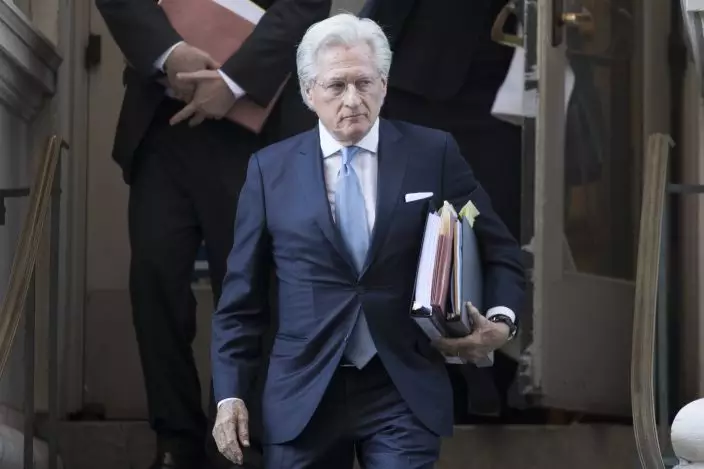
President Donald Trump's attorney Marc Kasowitz leaves New York state appellate court, Thursday, Oct. 18, 2018, in New York. President Donald Trump's lawyers hope to persuade an appeals court to dismiss or delay Summer Zervos' claim that he defamed her by calling her a liar after she accused him of unwanted kissing and groping. (AP PhotoMary Altaffer)
Thursday's court session focused on one of the Trump legal team's central arguments: that a sitting president can't be sued in a state court over conduct outside official duties. It made for a largely law-school-like discussion about Constitutional clauses and legal interpretation.
But state Supreme Court Appellate Division Justices Peter Tom and Angela Mazzarelli had some theoretical questions about practical matters: Could a president be taken to a city small-claims court? Or jailed by a state judge who could hold the commander-in-chief in contempt of court after an order was disregarded?
Trump lawyer Marc Kasowitz suggested the contempt question helped prove his point.
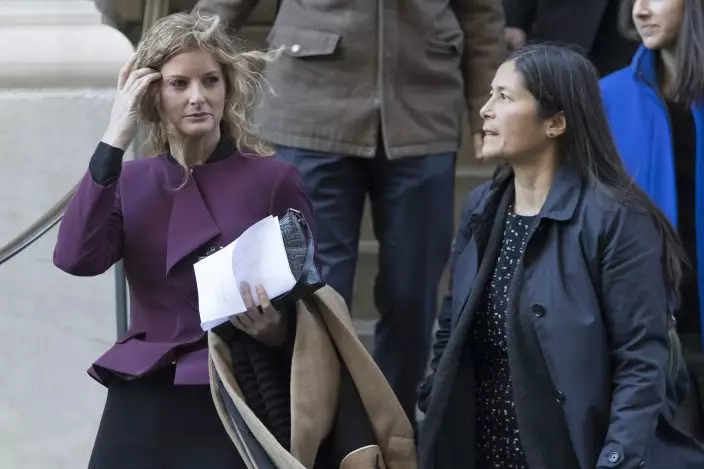
Summer Zervos, left, leaves New York state appellate court with here attorney Mariann Wang, Thursday, Oct. 18, 2018, in New York. President Donald Trump's lawyers hope to persuade an appeals court to dismiss or delay Zervos' claim that he defamed her by calling her a liar after she accused him of unwanted kissing and groping. (AP PhotoMary Altaffer)
"I think there is something really, really telling about that argument," he said.
Zervos' attorney, Mariann Wang, said it's unlikely the hypothetical scenario would ever happen and the Constitution doesn't shield a president from state court suits over non-official conduct.
"The president does not stand above the law. He is still a human being," she said.
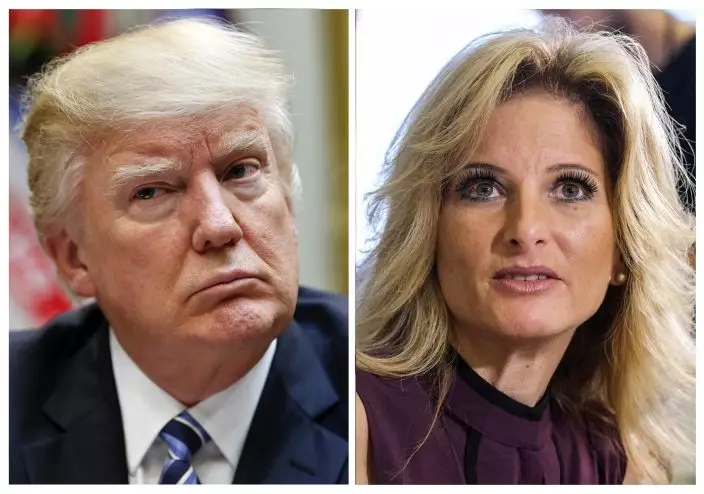
FILE - In this combination photo, President Donald Trump, left, listens during a meeting at the White House, on March 13, 2017 in Washington and Summer Zervos, a former contestant on "The Apprentice" appears at a news conference in Los Angeles on Oct. 14, 2016. Lawyers for Trump hope to persuade a New York appeals court on Thursday, Oct. 18, 2018, to dismiss or delay a lawsuit against him by former "Apprentice" contestant Summer Zervos. Zervos sued the president for calling her a liar after she accused him of unwanted kissing and groping.(AP PhotosPablo Martinez Monsivais, left, and Ringo H.W. Chiu, Files)
The appeals panel peppered both sides with queries and, as is common, didn't immediately issue a decision.
The U.S. Supreme Court ruled in 1997 that then-President Bill Clinton wasn't immune from a federal sexual harassment lawsuit concerning an alleged encounter with an Arkansas state employee while he was governor. But the high court didn't settle the question of whether a president could be sued in a state court over unofficial conduct.
During that suit, Clinton was held in contempt of court for providing what a federal judge said was misleading testimony during a deposition — a session of pre-trial questioning under oath. Clinton was fined more than $90,000.
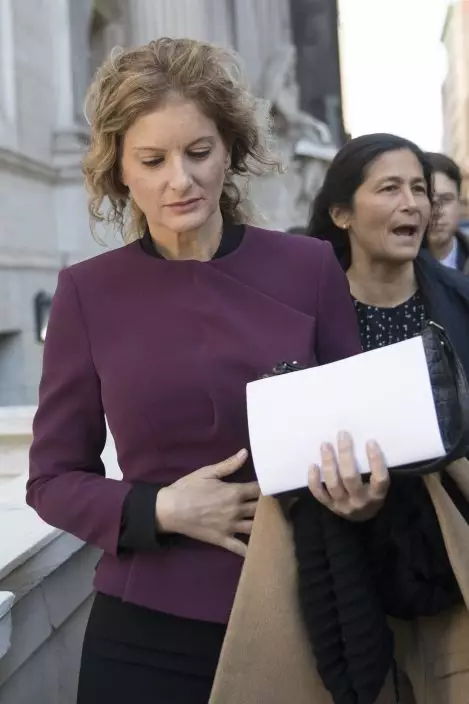
Summer Zervos leaves New York state appellate court, Thursday, Oct. 18, 2018, in New York. President Donald Trump's lawyers hope to persuade an appeals court to dismiss or delay Zervos' claim that he defamed her by calling her a liar after she accused him of unwanted kissing and groping. (AP PhotoMary Altaffer)
Zervos, a California restaurateur, watched intently from the court audience, sitting forward in her seat while Wang argued her case. Outside court, Zervos didn't comment on the case but asked the public to contribute to a GoFundMe page to help pay her attorneys.
"They've worked very hard, and they haven't been paid up until this point," she said.
Zervos appeared on "The Apprentice" in 2006, when Trump was the reality show's host. She says she met with him twice the next year, seeking career advice but getting unwelcomed kisses and groping.
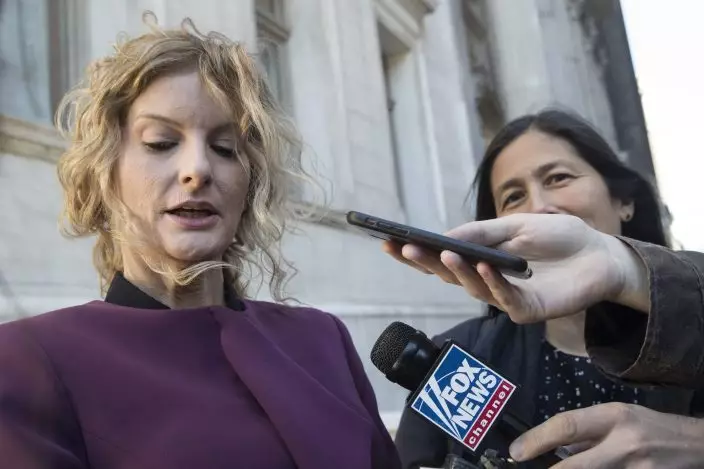
Summer Zervos, left, is joined by her attorney Mariann Wang as she makes a statement to reporters outside New York state appellate court, Thursday, Oct. 18, 2018, in New York. President Donald Trump's lawyers hope to persuade an appeals court to dismiss or delay Zervos' claim that he defamed her by calling her a liar after she accused him of unwanted kissing and groping. (AP PhotoMary Altaffer)
According to her lawsuit, she didn't broach the encounters publicly for years because she thought they were isolated episodes of bad behavior by a businessman she admired. She went public with her allegation after an "Access Hollywood" recording emerged in October 2016 of Trump boasting about groping women.
Trump — by then the Republican presidential nominee — denied Zervos' claims and retweeted a message calling them "a hoax."
He also launched broadsides on Twitter and on rally stages against all the dozen-plus women who broached sexual misconduct claims against him around that same time, calling them "liars" peddling "totally made-up nonsense to steal the election," among other comments.
Zervos' lawyers say his comments were factual falsehoods that subjected her to threats and made her restaurant lose business. Trump's lawyers say his remarks were opinions that he had a free-speech right to express in the course of politics.
Zervos is seeking a retraction, an apology and compensatory and punitive damages. Like Trump, she is a Republican.
Both sides have continued gathering evidence while they await the appeals court's decision on whether the case can proceed, and they have been clashing over the scope of documents they should have to provide one another.
A Manhattan court is set to hear arguments on those issues next week.
UNITED NATIONS (AP) — Russia on Wednesday vetoed a U.N. resolution sponsored by the United States and Japan calling on all nations to prevent a dangerous nuclear arms race in outer space, calling it “a dirty spectacle” that cherry picks weapons of mass destruction from all other weapons that should also be banned.
The vote in the 15-member Security Council was 13 in favor, Russia opposed and China abstaining.
The resolution would have called on all countries not to develop or deploy nuclear arms or other weapons of mass destruction in space, as banned under a 1967 international treaty that included the U.S. and Russia, and to agree to the need to verify compliance.
U.S. Ambassador Linda Thomas-Greenfield said after the vote that Russian President Vladimir Putin has said Moscow has no intention of deploying nuclear weapons in space.
“Today’s veto begs the question: Why? Why, if you are following the rules, would you not support a resolution that reaffirms them? What could you possibly be hiding,” she asked. “It’s baffling. And it’s a shame.”
Russia’s U.N. Ambassador Vassily Nebenzia dismissed the resolution as “absolutely absurd and politicized,” and said it didn’t go far enough in banning all types of weapons in space.
Russia and China proposed an amendment to the U.S.-Japan draft that would call on all countries, especially those with major space capabilities, “to prevent for all time the placement of weapons in outer space, and the threat of use of force in outer spaces.”
The vote was 7 countries in favor, 7 against, and one abstention and the amendment was defeated because it failed to get the minimum 9 “yes” votes required for adoption.
The U.S. opposed the amendment, and after the vote Nebenzia addressed the U.S. ambassador saying: “We want a ban on the placement of weapons of any kind in outer space, not just WMDs (weapons of mass destruction). But you don’t want that. And let me ask you that very same question. Why?”
He said much of the U.S. and Japan’s actions become clear “if we recall that the U.S. and their allies announced some time ago plans to place weapons … in outer space.”
Nebenzia accused the U.S. of blocking a Russian-Chinese proposal since 2008 for a treaty against putting weapons in outer space.
Thomas-Greenfield accused Russia of undermining global treaties to prevent the spread of nuclear weapons, irresponsibly invoking “dangerous nuclear rhetoric,” walking away from several of its arms control obligations, and refusing to engage “in substantive discussions around arms control or risk reduction.”
She called Wednesday’s vote “a real missed opportunity to rebuild much-needed trust in existing arms control obligations.”
Thomas-Greenfield’s announcement of the resolution on March 18 followed White House confirmation in February that Russia has obtained a “troubling” anti-satellite weapon capability, although such a weapon is not operational yet.
Putin declared later that Moscow has no intention of deploying nuclear weapons in space, claiming that the country has only developed space capabilities similar to those of the U.S.
Thomas-Greenfield said before the vote that the world is just beginning to understand “the catastrophic ramifications of a nuclear explosion in space.”
It could destroy “thousands of satellites operated by countries and companies around the world — and wipe out the vital communications, scientific, meteorological, agricultural, commercial, and national security services we all depend on,” she said.
The defeated draft resolution said “the prevention of an arms race in outer space would avert a grave danger for international peace and security.” It would have urged all countries carrying out activities in exploring and using outer space to comply with international law and the U.N. Charter.
The draft would have affirmed that countries that ratified the 1967 Outer Space Treaty must comply with their obligations not to put in orbit around the Earth “any objects” with weapons of mass destruction, or install them “on celestial bodies, or station such weapons in outer space.”
The treaty, ratified by some 114 countries, including the U.S. and Russia, prohibits the deployment of “nuclear weapons or any other kinds of weapons of mass destruction” in orbit or the stationing of “weapons in outer space in any other manner.”
The draft resolution emphasized “the necessity of further measures, including political commitments and legally binding instruments, with appropriate and effective provisions for verification, to prevent an arms race in outer space in all its aspects.”
It reiterated that the U.N. Conference on Disarmament, based in Geneva, has the primary responsibility to negotiate agreements on preventing an arms race in outer space.
The 65-nation body has achieved few results and has largely devolved into a venue for countries to voice criticism of others’ weapons programs or defend their own. The draft resolution would have urged the conference “to adopt and implement a balanced and comprehensive program of work.”
At the March council meeting where the U.S.-Japan initiative was launched, U.N. Secretary-General António Guterres warned that “geopolitical tensions and mistrust have escalated the risk of nuclear warfare to its highest point in decades.”
He said the movie “Oppenheimer” about Robert Oppenheimer, who directed the U.S. project during World War II that developed the atomic bomb, “brought the harsh reality of nuclear doomsday to vivid life for millions around the world.”
“Humanity cannot survive a sequel to Oppenheimer,” the U.N. chief said.

United States Ambassador and Representative to the United Nations Linda Thomas-Greenfield addresses members of the U.N. Security Council before voting during a meeting on Non-proliferation of nuclear weapons, Wednesday, April 24, 2024 at United Nations headquarters. (AP Photo/Eduardo Munoz Alvarez)

FILE - U.S. Ambassador to United Nations Linda Thomas-Greenfield speaks on Thursday, April 18, 2024, in Tokyo. The U.N. Security Council is set to vote Wednesday, April 24, 2024, on a resolution announced by Thomas-Greenfield, calling on all nations to prevent a dangerous nuclear arms race in outer space. It is likely to be vetoed by Russia. (AP Photo/Eugene Hoshiko, Pool, File)
















